- Home page
- Researchers
- Ivana P. Bodrožić
Ivana P. Bodrožić
University of Criminal Investigation and Police Studies

CONTINUOUS CRIMINAL INTERVENTIONISM ‒ AT THE BACKGROUND OF POLICY AND LAW
Although criminal law, as a system of legal norms, must constantly adapt to the conditions of contemporary crime, in the context of rapid and dynamic development of society and social relations, it should be a solid and relatively conservative system of regulations. The author gives an overview and analysis of the character, content and orientation of the changes within the provisions of the Criminal Code (CC), which has been amended seven times in 14 years of its implementation. This has been used as a basis for drawing conclusions on what is the ratio legis of constant reformation and answering several groups of questions: Is it necessary to adapt to contemporary, emerging forms of crime in order to raise the principle of criminal justice efficiency, to align with internationally assumed commitments? Or fulfilling populist tendencies towards “as much criminal law and punishment as possible” in order to achieve short-term political goals? In conclusion, the author emphasizes that the reform processes in the field of substantive criminal law in the Republic of Serbia, after the entry into force of the 2006 Criminal Code, which encompasses the adoption of seven laws, can be determined by the epithet of interventionism and the epithet of continuity, and find their ratio legis in the realm of law, but also in the realm of politics. In the end, the author emphasizes that reforms in the field of substantive criminal law, as a purely legal mechanism for controlling crime, must be in accordance with the scope, dynamics and forms of contemporary crime, opposed to all forms of its politicization in order to achieve daily political goals.
